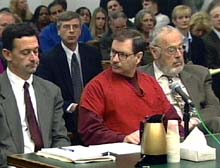Green River Killer avoids death in plea deal

In confessing to more murders than any other serial killer in U.S. history Wednesday, the 54-year-old former truck painter provided heart-wrenching details of the 48 women he murdered to their families gathered in a Seattle courtroom to hear his confession.
Ridgway pleaded guilty to 48 counts of aggravated murder and agreed to provide information to help locate remains lost for nearly two decades in exchange for prosecutors agreeing not to seek the death penalty.
King County prosecutor Norm Maleng said Ridgway agreed to help investigators locate and identify the remains of some of those victims whose bodies remain undiscovered if prosecutors dropped efforts to obtain a death sentence.
And King County Sheriff Dave Reichert told CNN's Paula Zahn: "The majority of the families were understanding and in agreement that it was probably the best decision given the circumstances in order that the other 41 families would have the same resolution."
Ridgway affirmed a 16-page statement admitting to the killings as King County Deputy Prosecutor Jeff Baird read the document aloud in court Wednesday.
In his statement, Ridgway said he targeted prostitutes "because I thought I could kill as many as I wanted without getting caught."
"Gary Ridgway does not deserve our mercy, and Gary Ridgway does not deserve to live," Maleng said. "The mercy provided by today's resolution is not directed toward Gary Ridgway, but toward the families who suffered so much and to the larger community."
"I hate most prostitutes. I did not want to pay them for sex," Ridgway acknowledged. "I also picked prostitutes as victims because they were easy to pick up, without being noticed. I knew they would not be reported missing right away, and might never be reported missing."
Some relatives of the victims wept in the courtroom as Ridgway confessed.
Ridgway also acknowledged that killing was his intent before meeting the women.
"In most cases, when I murdered these women, I did not know their names," Ridgway's statement to the court said. "Most of the time, I killed them the first time I met them. I do not have a good memory for their faces. I killed so many women, I have a hard time keeping them straight."
Ridgway admitted placing the bodies in "clusters," usually near a landmark that helped him remember their locations.
"I did this because I wanted to keep track of all of the women I killed," he said in his statement, which he affirmed as Baird read it aloud. "I liked to drive by the clusters around the county and think about the women I placed there."
Prosecution seeks more information on victims
The Green River Killer's slaying spree began in 1982, when women in the Seattle area, mainly runaways and prostitutes were targeted. The first victims turned up near the banks of the Green River south of Seattle, giving Ridgway his moniker.
I do not have a good memory for their faces.
I killed so many women,
I have a hard time keeping them straight.
—— Gary Ridgway
The remains of dozens of women turned up near Pacific Northwest ravines, rivers, airports and freeways in the 1980s. Investigators officially listed 49 of them as probable victims of the Green River Killer.
Ridgway led investigators to three sets of remains over the summer. The bodies of four of the 48 women Ridgway admitted killing have yet to be found.
Judge Richard A. Jones put off sentencing for up to six months to allow investigators to question Ridgway in more detail. Baird said the state eventually would ask Jones to sentence Ridgway to 48 consecutive life terms in prison without the possibility of parole.
Six women whose deaths were attributed to the Green River Killer were not among the charges Ridgway admitted to Wednesday. Ridgway confessed to killing five women whose names were not among the known Green River victims, and his lawyers said he could face charges in other jurisdictions, as well.
Two of the bodies on the official list of 49 Green River victims were found in Oregon, which has capital punishment
Ridgway, who was arrested in 2001, had been scheduled for trial in July 2004 in connection with the deaths of seven of the women. Prosecutors said DNA evidence linked him to at least some of those seven slayings.
Baird said the rest of those cases might not have been resolved without the plea agreement, and he said most of the victims' families agreed with the deal.
"These individuals are all in a state of grief. They are angry and upset," he said. "But I believe I can say with assurance that most of them —— a majority of them —— agree in principle with the plea agreement, and there are a few, I'm told, that do not."
"I find it incredible that an individual was able to cause that many deaths, perpetrate that much suffering and misery on so many people," said Joe Yellow Robe, father of victim Patricia Yellow Robe